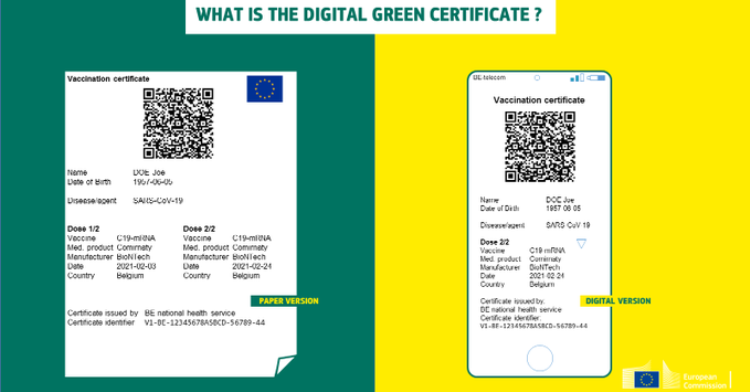The Diplomat
The decision of the Permanent Representatives to the EU to approve the negotiating mandate with the European Parliament on the proposed digital green certificate opens the door for this instrument to be ready by the summer of 2021, as repeatedly requested by the Spanish government.
The Permanent Representatives Committee of the European Union (COREPER) approved this past Wednesday the negotiation mandate with the European Parliament on the proposal for the digital certificate proposed by the European Commission to facilitate safe and free movement during the COVID-19 pandemic. The purpose of the certificate is to certify that a person has been vaccinated against the coronavirus, has a negative test result or has recovered from the disease.
“Another step forward in the adoption of an EU certificate of COVID vaccination”, Foreign Minister Arancha Gonzalez Laya said on her Twitter account. “Now the Member States and the European Parliament are going to work to approve it in June and prepare to reactivate mobility in an orderly and safe way”, she added.
Last March 17, the European Commission presented two proposals for regulations, subject to the ordinary legislative procedure, to create a digital green certificate and facilitate the safe free movement of citizens within the EU during the COVID-19 pandemic. The aim of this triple certificate, according to Brussels, is to “avoid discrimination against people who are not vaccinated” and to allow “all citizens, vaccinated and unvaccinated,” to “benefit from a green digital certificate when traveling in the EU”.
Two days later, the Permanent Representatives to the EU approved the creation and mandate of the ad hoc Group to accelerate, as a matter of priority, the negotiation of the referenced proposals. Finally, and after several meetings of the working group, the EU ambassadors themselves agreed last Wednesday on a common position to start negotiations with the European Parliament.
On March 25, the European Parliament approved the use of the urgency procedure for the parliamentary processing of the new digital green certificate with a view to its adoption before the summer. According to the EU, the European Parliament is expected to approve its position at its April 26-29 plenary session and, thereafter, inter-institutional negotiations will begin as soon as possible. The outcome of the negotiation between the co-legislators will have to be confirmed by both the plenary of the Parliament and the Council. Once adopted, the certificate should enter into force six weeks later, namely in June.
In fact, according to the EU, the Member States stressed this Wednesday “their commitment to have the framework ready by the summer of 2021”, as the Spanish government has demanded in order to save, at least in part, this year’s tourist season. The last to do so was the President of the Government, Pedro Sánchez, who last March 25 asked during the telematic meeting of the European Council to speed up the procedures so that the certificate can come into operation next June.
The certificate was proposed by Greece at the beginning of the year and had the immediate support of Spain and other southern European countries more dependent on tourism, such as Spain, Italy, Malta, Cyprus and Portugal. In contrast, it had generated little enthusiasm in countries such as France, Germany, Belgium, the Netherlands and Luxembourg, which had expressed fears that the certificate would discriminate against people who had not been vaccinated. As a result, the text approved by COREPER makes it clear that “possession of a Digital Green Certificate is not a precondition for exercising free movement rights”. Therefore, it is not a passport.






